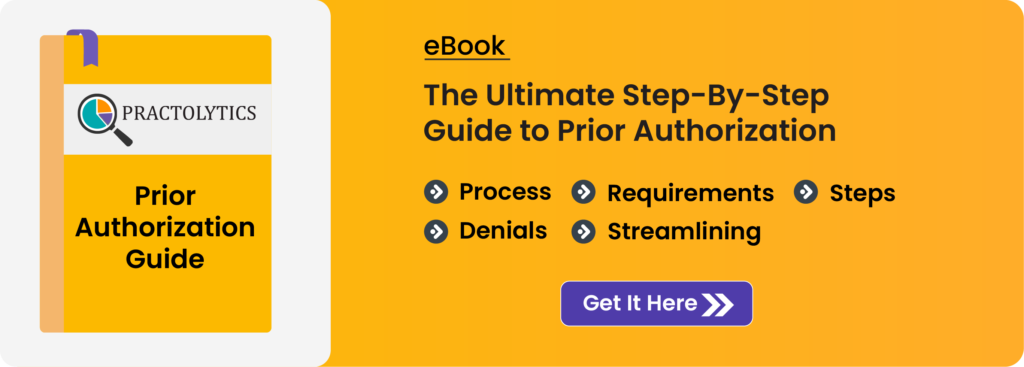These Prior Authorization Errors Could Delay Treatment
These Prior Authorization Errors Could Delay Treatment—and create unnecessary stress for your practice and patients. If you’ve ever faced denials, delays, or outdated payer rules, you’re not alone. We highlight the 10 most common mistakes that slow down care and shrink revenue, and show you exactly how to avoid them. From missing documentation to insurance mix-ups, we cover it all. Practolytics streamlines the process so your team can focus on patient care instead of endless paperwork. Let’s simplify prior authorizations together—say goodbye to delays, and hello to faster approvals and happier patients.
Table of Contents
These 10 Prior Authorization Errors Could Delay Treatment—And What You Can Do About It!
Let’s start with the hard truth.
Prior authorization delays can be devastating—not just for your practice’s bottom line, but for your patients’ well-being.
In fact, the Medical Group Management Association (MGMA) reports that 1 in 4 patients face care delays due to prior authorization issues. And according to the American Medical Association, 93% of physicians say prior auths lead to treatment delays, while 30% say it has even led to a serious adverse event.
This isn’t a paperwork issue—it’s a patient care issue.
At Practolytics, we’ve seen firsthand how simple missteps in the healthcare prior authorization process can snowball into weeks of treatment delays, missed revenue, and frustrated patients. As a leading multi-specialty billing company serving over 1400+ providers across 31 states and processing 5 million+ claims annually, we know where things go wrong—and how to fix them.
Let’s unpack 10 of the most common and complex prior authorization mistakes that practices make, and why they can bring everything to a grinding halt. Stick around till the end, because we’ll also show you how outsourcing this entire headache could change your life (and your clinic’s).
PA Process Is Not Broken. It’s Just Complicated.
Before we jump in, let’s agree on one thing: Prior authorization is not the enemy. It’s a control mechanism designed to make healthcare safer and more cost-effective.
But here’s where it hurts—the process is often manual, inconsistent, and riddled with insurer-specific requirements. If you miss even a minor checkbox, you’re looking at days (if not weeks) of back-and-forth communication.
So, what are the most common reasons prior authorizations get denied, delayed, or ignored? Let’s take a look.
1: Incomplete Clinical Documentation
Ever tried getting approval with just a diagnosis code? Insurers want more. If your request lacks supporting clinical notes, progress reports, imaging results, or lab work, it’s going nowhere fast.
The PA process is like a legal argument—you need evidence, not assumptions.
2: Submitting to the Wrong Insurance Payer
You’d be surprised how often this happens. A patient switches plans, and no one catches it. Submitting to the wrong payer doesn’t just lead to denials—it can trigger full pre-authorization cycles. And yes, the clock resets.
Double-checking insurance eligibility upfront can cut delays by up to 40%, according to industry data.
3: Using Outdated Payer Guidelines
Payers revise their PA rules often—sometimes multiple times a year. What was acceptable in March might be obsolete by July.
Failing to stay current with payer-specific documentation or treatment criteria results in fast-track denials. And appealing a denial? That’s a new mountain of paperwork.
4: Rushing the Submission Timeline
Not all treatments are emergencies. But waiting until the last minute to file prior auths forces staff to scramble—and insurers don’t reward urgency with flexibility.
For instance, many payers require 5–7 business days for standard reviews. Submitting too close to a scheduled procedure risks cancellation, rebooking, or worse, patient dissatisfaction.
5: Authorization Expired Before Treatment
Most prior auths have a limited validity window—commonly 30 to 90 days. If treatment is postponed or rescheduled, and that window closes? Yep—you’re starting from scratch.
Even worse, some payers don’t notify you that an authorization is expiring. The burden’s on you to keep track.
6: Unlisted CPT or HCPCS Codes
Medical billing with generic, outdated, or mismatched codes is a denial waiting to happen. Prior authorization is CPT code–specific, and many services require precise modifiers.
Insurers aren’t going to assume what you meant. If the code doesn’t match their PA list, they won’t approve it—even if the treatment is medically necessary.
7: No Record of PA Approval (or Denial)
Let’s say you did everything right. You submitted documents, got approval, and moved forward.
But then the claim gets denied. Why? Because you didn’t retain proof of authorization—or the insurer “lost” it in their system. Without clear records, reprocessing is nearly impossible.
That’s why detailed tracking systems are no longer optional. They’re essential.
8: Lack of Real-Time Tracking
If your team is using spreadsheets, email, or sticky notes to track PA status… you’re flying blind.
Modern practices need real-time dashboards to monitor approvals, spot expiring authorizations, and flag requests stuck in review.
At Practolytics, our integrated systems allow you to track PA status like tracking a shipment—complete with alerts, timelines, and payer-specific updates.
9: No Appeal Strategy in Place
Denials happen—even with the best documentation. But many practices don’t have a structured appeals process or clinical staff ready to challenge payer decisions.
Without timely appeals, claims die quietly. That’s revenue left on the table and care postponed unnecessarily.
10: Handling Everything In-House Without Enough Support
And this is the biggest one of all.
Most practices—especially smaller ones—don’t have the resources, time, or training to handle complex, high-volume prior authorizations internally. That’s not a knock on your staff. It’s just the reality.
Which brings us to the solution more and more practices are choosing…
When in Doubt, Outsource: A Smarter Way to Handle Prior Authorizations!
Prior authorizations are time-consuming, resource-draining, and constantly evolving. For growing practices, especially those managing multiple specialties or high-volume procedures, outsourcing this function isn’t just smart—it’s essential.
Let’s break it down.
|
In-House Prior Authorization |
Outsourced Prior Authorization with Practolytics |
|
Staff overwhelmed with paperwork Front desk and billing staff often juggle prior auths with other admin duties. As volumes grow, this leads to delays, errors, and employee fatigue. |
Dedicated PA experts handle end-to-end process Practolytics provides a specialized team focused solely on authorizations—freeing your staff to focus on patients and operations. |
|
Manual tracking and status calls Spreadsheets, sticky notes, and chasing payer reps are still the norm. These outdated methods slow things down. |
Real-time dashboards and alerts We use smart technology that offers real-time tracking, status updates, and automated workflows to keep everything moving. |
|
Higher risk of denials Incomplete clinical documentation or medical coding mismatches often result in preventable denials and resubmissions. |
60% fewer rejections due to accurate submissions Our team ensures everything is done right the first time—reducing rework and improving first-pass success rates. |
|
Delayed treatments = unhappy patients Authorization delays mean longer wait times, rescheduled procedures, and lower patient satisfaction. |
Faster approvals = smoother care delivery With Practolytics, patients receive timely care, and your staff spends less time fielding complaints. |
|
Inconsistent payer knowledge Internal teams may not be updated on each payer’s latest rules, forms, and medical necessity criteria. |
Up-to-date with payer-specific guidelines Our specialists stay ahead of frequent insurer changes to ensure compliance and timely submissions. |
|
Missed renewals and expirations Without proper alerts, authorizations can lapse before treatment, forcing re-submission and delays. |
Automated reminders and tracking We track expiry dates and proactively manage renewals, keeping treatments on schedule. |
|
Hidden revenue loss Delayed or denied authorizations can lead to missed appointments, cancelled procedures, and unreimbursed claims. |
Optimized revenue capture Fewer delays mean fewer missed billing opportunities, helping you retain revenue and operate smoothly. |
|
Lack of scalability As patient volume grows, internal teams may struggle to keep up with rising PA demands. |
Built to scale Whether you’re a solo provider or a multi-location practice, our systems and team grow with you. |
With Practolytics, you’re not just getting another vendor—you’re gaining a strategic partner. Our team is 100% HIPAA-compliant, equipped with over two decades of experience, and specialized in over 28 medical specialties.
We’ve built our workflows to integrate seamlessly with your AdvancedMD EHR systems and practice management tools. So instead of your staff chasing down approvals, they can focus on what they do best—caring for patients.
Real Impact. Real Results.
- 60% fewer denials due to complete and accurate submissions
- Up to 3x faster approvals through dedicated PA coordination
- 20% higher patient satisfaction from reduced waiting times
- Significant revenue recovery from fewer missed treatments
We’ve helped practices avoid costly treatment delays, recover revenue lost to denials, and slash admin time by over 50%. And we do it with a human touch—our account managers know your specialty, your workflows, and your patients’ needs.
Let’s Face It—Prior Authorization Isn’t Going Anywhere!
If anything, the burden is increasing. CMS reported in 2023 that they saved $845 million by avoiding unnecessary treatments through PA enforcement. Which means more procedures will soon require prior approval—not less.
The smartest thing your practice can do right now? Get ahead of it.
With Practolytics, you gain more than efficiency—you gain peace of mind. Your authorizations are handled by specialists, your patients are scheduled without interruption, and your revenue flows consistently.
Read More – Prior Authorization Services for Podiatry : improving Patient Access and Care
Talk to Medical Billing Expert Today — Get a Free Demo Now!





